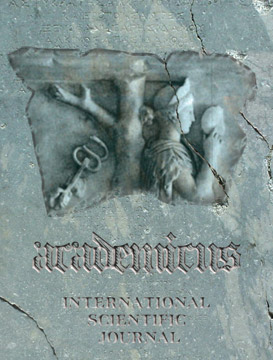Title:
The Technological Expansion of Sociability: Virtual Communities as Imagined Communities
Full Reference List:
| 1. | Anderson, Benedict. 1991. Imagined Communities: Reflections on the origin and spread of nationalism. New York: Verso. |
| 2. | Bakardjieva, Maria. 2005. Internet Society: The Internet Everyday Life. London, Thousand Oaks, New Delhi: Sage Publications. |
| 3. | Baym, Nancy. 2000. Tune In, Log on: Soaps, Fandom, and Online Community. Thousand Oaks, London, New Delhi: Sage Publications. |
| 4. | Brabazon, Tara. 2001. “How imagined are virtual communities? Mots pluriels 18, http://www.arts.uwa.edu.au/MotsPluriels/MP1801tb2.html. |
| 5. | Castells, Manuel. 2001. L’Ère de l’information, vol. I, La société en réseaux. Paris: Fayard. |
| 6. | Fernback, Jan. 2007. „Beyond the diluted community concept: a symbolic interactionist perspective on online social relations”, in New Media and Society, vol. 9, no. 1, pp. 49-69. |
| 7. | Flichy, Patrice. 2003. L’Innovation technique. Récents développments en sciences sociales. Paris: La Découverte. |
| 8. | Ferrarotti, Franco. “On the way to «Creative Empathy»: the concept of truth as a social community enterprise in GB Vico’s «New Science».” Academicus International Scientific Journal 2 (2010): 10-25. |
| 9. | Foster, Derek. 1996. “Community and Identity in the Electronic Village”. In Internet Culture, edited by David Porter, 23-37. New York: Routledge. |
| 10. | Fox, Steve. 2004. “The New Imagined Community: Identifying and Exploring a Bidirectional Continuum Integrating Virtual and Physical Communities through the Community Embodiment Model (CEM)”. Journal of Communication Inquiry 28 (1): 47-62. |
| 11. | Gibson, William. 1984. Neuromancer. New York: Mass Market Paperback. |
| 12. | Gradinaru, Camelia. 2011. “Virtual Communities – A New Sense of Social Intersection”. Journal of Communication and Public Relations, vol. 13, no. 1 (21): 21-35. |
| 13. | Gruzd, Anatoliy, Wellman, Barry, and Takhteyev, Yuri. 2011. “Imagining Twitter as an Imagined Community”. American Behavioral Scientist 55 (10): 1294-1318. |
| 14. | Haythornthwaite, Caroline and Wellman, Barry. 2002. “The Internet in Everyday Life. An Introduction”. In The Internet in Everyday Life, edited by Barry Wellman and Caroline Haythornthwaite, 3-41. Oxford: Blackwell Publishers Ltd. |
| 15. | Hill Collins, P. 2010. “The New Politics of Community”. American Sociological Review 75 (1): 7-30. |
| 16. | Musaraj, Arta, and Argita Malltezi. “Communication Technologies and the public service: Is it the case of citizens inclusion in the public service standard in Albania?.” Academicus International Scientific Journal 5 (2012): 26-42. |
| 17. | Hillary, George. 1955. “Definitions of Community: Areas of Agreement”. Rural Sociology 20: 111-123. |
| 18. | Ishii, Kenichi. 2006. ”Implications of Mobility: The Uses of Personal Communication Media in Everyday Life”. Journal of Communication 56: 346- 365. |
| 19. | Kollock, Peter. 1999. “The economies of online cooperation: gifts and public goods in cyberspace”. In Communities in Cyberspace, edited by Peter Kollock and Marc Smith, 220-239. London: Routledge. |
| 20. | Vasmatics, Gabor. “The revolution of communication and its effect on our life.” Academicus International Scientific Journal 1 (2010): 100-108. |
| 21. | LaRose, Robert, Kim, Junghyun, and Wei, Peng. 2011. “Social Networking: Addictive, Compulsive, Problematic, or Just Another Media Habit?”. In A Networked Self. Identity, Community, and Culture on Social Network Sites, edited by Zizi Papacharissi, 59-81. N |
| 22. | Marwick, A. E. and boyd, danah. 2011. “I tweet honestly, I tweet passionately: Twitter users, context collapse, and the imagined audience”. New media & society 13(1): 114-133. |
| 23. | Matei, Sorin Adam. 2011. “Introduction”. In Virtual Sociability: From Community to Communitas, edited by Sorin Adam Matei and Brian C. Britt, 1-8. Indianapolis: Ideagora. |
| 24. | McLuhan, Marshall. 1994. Understanding Media. The Extensions of Man. New York: MIT Press. |
| 25. | Norton, Bonny. 2001. “Non-participation, imagined communities, and the language classroom”. In Learner contributions to language learning: New directions in research, edited by M. Breen, 159-171. Harlow: Pearson Education. |
| 26. | Rheingold, Howard. 2000. The Virtual Community: Homesteading on the Electronic Frontier. The MIT Press: Cambridge, Massachusetts, London. |
| 27. | Phillips, T. 2002. “Imagined communities and self-identity: an exploratory quantitative analysis”. Sociology 36 (3): 597-617. |
| 28. | Wellman, Barry; Haase, Anabel Quan; Witte, James; Hampton, Keith. 2001. ”Does the Internet Increase, Decrease, or Supplement Social Capital?”. American Behavioral Scientist 45 (3): 436-455. |
Back to article
Academicus
International Scientific Journal
pISSN 2079-3715
eISSN 2309-1088
Address:
Sheshi i Flamurit, Rruga Muze
Al-9401 Vlorë, Albania
Tel: +355 68 60 60 555
info@academicus.edu.al
https://academicus.edu.al


